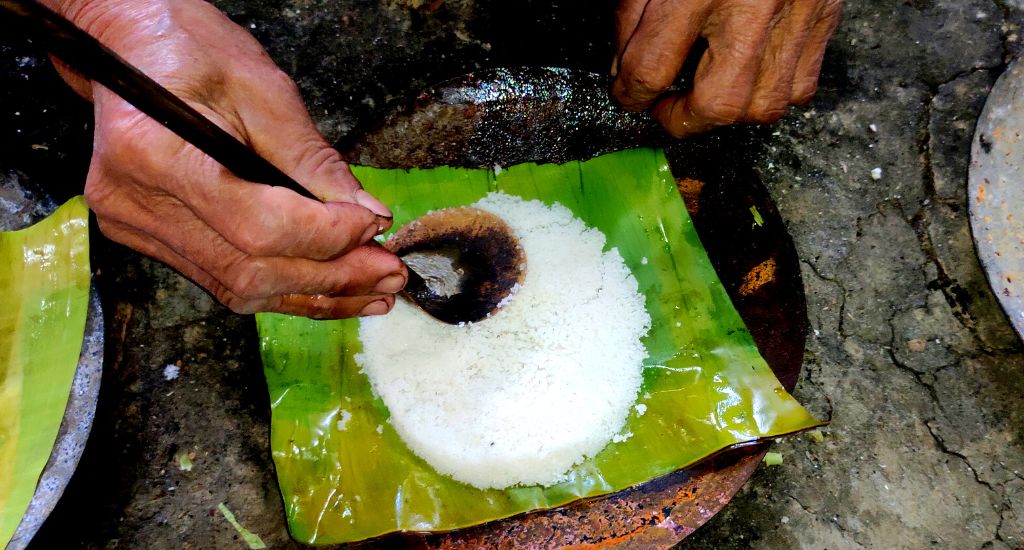
Manipur’s uncommon ‘salt of the earth’ and the threat to its legacy
Thumpak, the traditional salt cakes of Manipur, are still used for rituals, but their demand for everyday use has dwindled with the proliferation of commercial packaged salt.

Thumpak, the traditional salt cakes of Manipur, are still used for rituals, but their demand for everyday use has dwindled with the proliferation of commercial packaged salt.
K. Binoy Singh of Ningel village in the north-eastern state of Manipur has salt in his blood.
Like his forefathers before him, he has poured his blood and sweat into a revered craft of the Meitei people that many believe was taught in a divine apprenticeship.
Gods descended on earth to teach mortals how to crystallise brine spouting from springs into flat salt cakes. Those springs are called Thumkong and the cakes are thumpak – thum being salt in Meitei.
Founded on such firm footing, thumpak survived the taste of time.
But tastes are changing.
Landlocked and far-off from the sea, salt was scarce and precious in most of India’s north-eastern region in the past. It was one of the principal trading commodities, often used as money with even some salaries paid in salt.
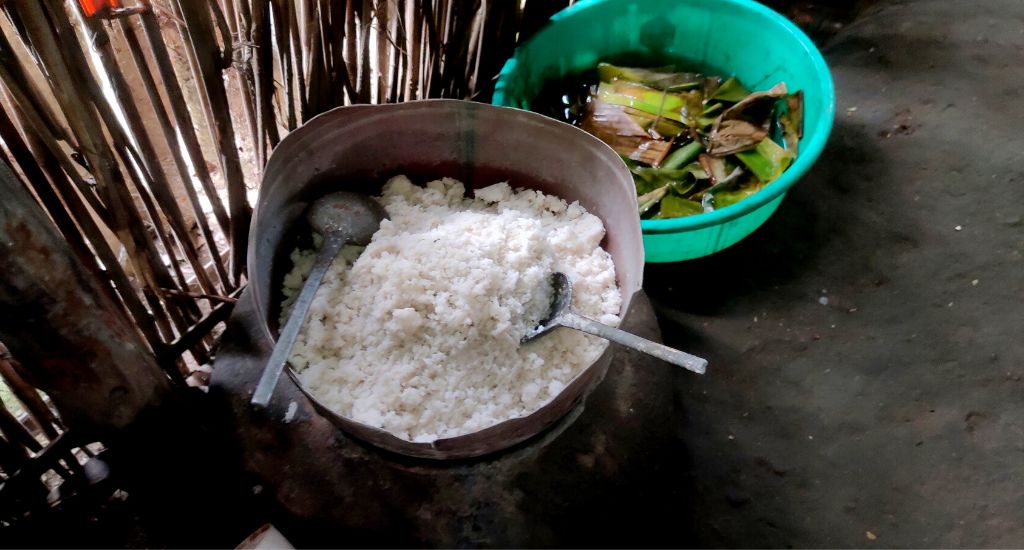
Thumpak ranked equal to gold.
But today, its existence is being tested by the easy access to cheap, commonplace sea salt produced in industrial-scale farms and sold in convenient plastic packets of varying weights.
Thumpak competes for space even in provisions stores in Ningel, the leafy village nestled in the wooded footfalls of Thoubal district, around 40km from the state’s capital city of Imphal.
Packaged salt is antithetical to the foundations of Ningel, where only eight households are now clinging on to making salt the old-fashioned way. In fact Ningel is the last holdout of thumpak.
While salt has lost favour as an everyday-use commodity, it has not lost its position in the social pecking order that transcends the material realm into the spiritual.
“It’s certainly an old trade. Kings would give away salt cakes to reward people. We believe goddess Thum Lairembi – the giver of all natural resources – guards saltwater springs.
Meitei rituals are incomplete without thumpak.
Ceremonies celebrating the birth of a newborn, or a wedding, or rites of passage after someone’s passing use thumpak.
Food offerings for goddess Panthoibi – the keeper of civilization, courage, fertility, love, victory, war and wisdom – are not kosher unless seasoned with thumpak.
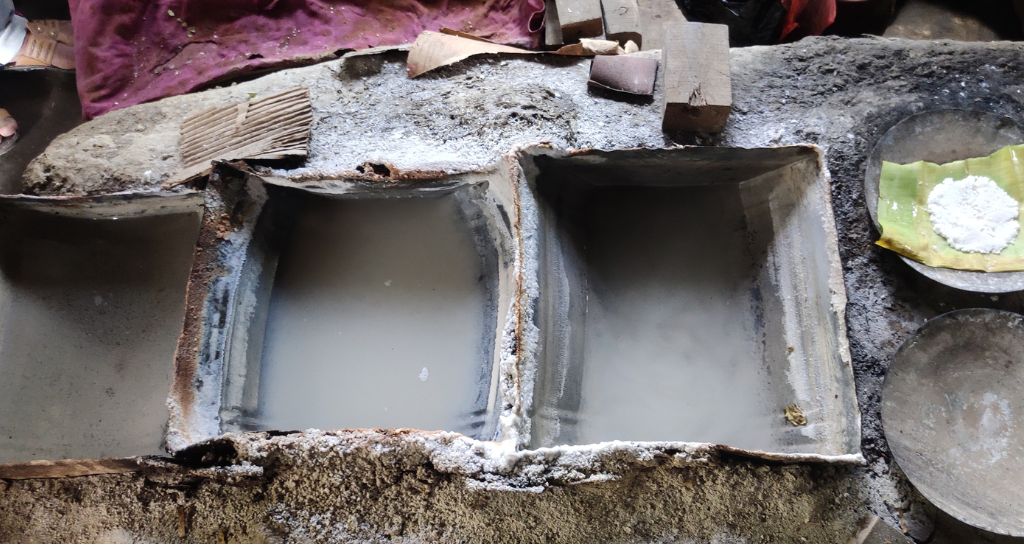
Details of its origin are imprecise.
“It’s certainly an old trade. Kings would give away salt cakes to reward people. We believe goddess Thum Lairembi – the giver of all natural resources – guards saltwater springs,” said Mutun Maimu, a 50-year-old salt-maker.
Every morning, 60-year-old Binoy walks with a pitcher to fetch saltwater from one of the three spring-fed wells, about 700 metres from his home.
This has been his unchanging routine for the past fifty years. He brings the water to a shed, known as Thumshung-shang, in his modest home to make salt cakes on a rectangular wood-fire hearth with multiple holes.
The Thumkongs, yellowed by years of pigmentation from mineral deposits, inspire awe and command deep respect.
“They are a mystery. All three are around 50-feet deep. One of them is 300 years old. They are always full, even in the driest of months,” said Binoy.
According to Mutun Maimu, many wells existed before across Manipur.
“But for the three in Ningel, all others have been covered or have gone to waste because no one uses them. The downfall can be attributed to packaged salt,” Maimu said.
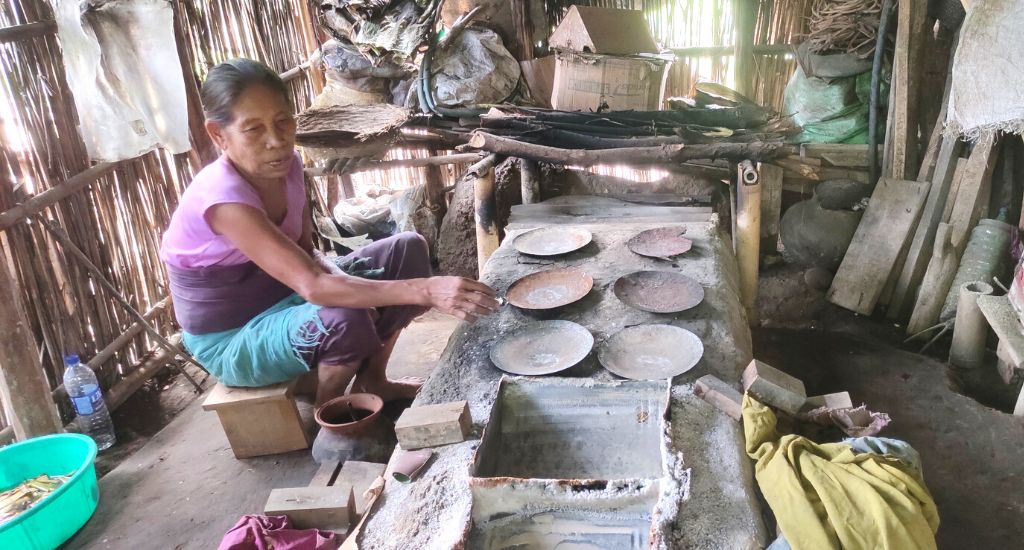
Even Ningel’s wells – the old one with a wooden fount and the other two made of concrete – are begging for repairs.
“They must be conserved for the future. Sadly, nobody cares,” Binoy said.
Thumpak is a circular disc of salt that looks like the south Indian rice pancake Appam or, to make it a little more complicated, a bleached lemon slice with veins dipped in liquid nitrogen.
Simple village-folks attest it to the white full moon.
Kunjarani Devi, 74, has salt in her DNA. She explained the intricate process passed down generations. The saltwater is boiled in pans on a wood fire until the water evaporates and the salt settles in its crystallised form.
“The water is transferred from one pan to another with a dry gourd spoon. It is then placed on an iron pan with a banana leaf covering the surface. The cakes are ready in a few hours,” she said. The leaf acts like a Teflon barrier; the pan gives the circular shape.
The seasoned salt-maker is salty about the way things are today.
The labour-intensive process is a fuel guzzler.
We do not get the right price for our hard work of 12-14 hours in the heat, humidity and smoke. Which is why youngsters aren’t interested in this trade. This legacy will die a silent death after our demise.
“We spend at least Rs 1,000 on firewood and Rs 100 every day to pay a water-bearer. My advanced age doesn’t allow me to fetch water from the wells. The returns are little to nothing,” Kunjarani said.
Each salt-maker makes around 200 pieces of cakes every day, weighing roughly around 100 grams apiece.
“Thumpak still has a demand,” said Soibam Manaobi, 40.
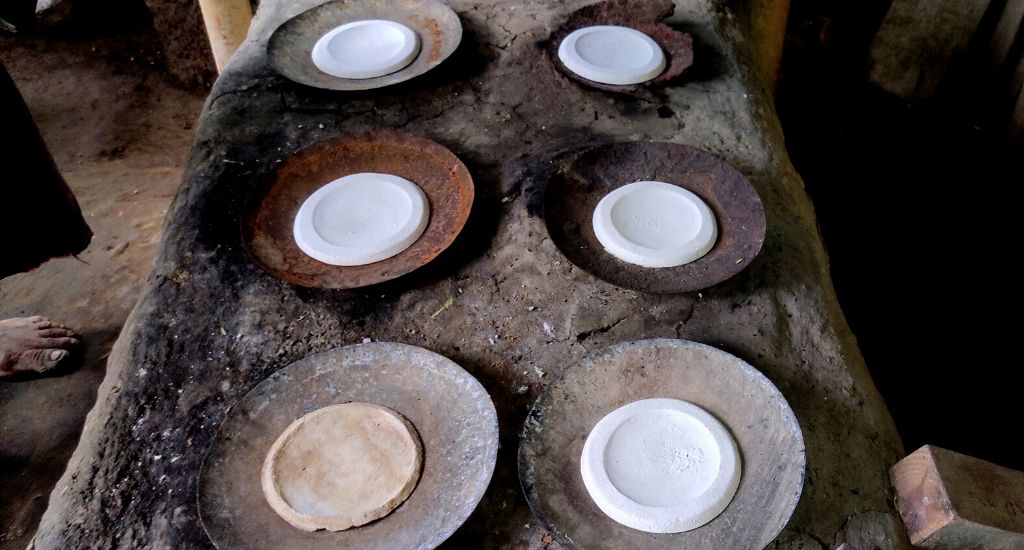
But the remoteness of their village, bad connectivity, poor marketing, crooked middlemen who buy on the cheap and sell to retailers at marked-up prices, and the availability of commercial common salt have conspired against Ningel’s industry.
“We don’t get the right price for our hard work of 12-14 hours in the heat, humidity and smoke that constantly confronts our health. We sell our cakes at Rs 20 apiece. Which is why youngsters aren’t interested in this trade. This legacy will die a silent death after our demise,” Soibam said, sounding chillingly ominous.
Ningel appears stuck in a tense battle between its past, present and future.
But 19-year-old college student Naresh Meitei spoke for almost everyone his age wondering why anyone would get stuck in a backbreaking trade that pays little and harms the environment by burning wood from shrinking forests.
“I would opt for a good job rather than taking up this work,” he said.
But some of the young might still be drawn to pouding salt as the weight of history might continue to play its role shaping the choices and actions of individuals.
The lead image at the top shows flattening of the rice cake on banana leaves (Photo by Gurvinder Singh)
Gurvinder Singh is a journalist based in Kolkata.